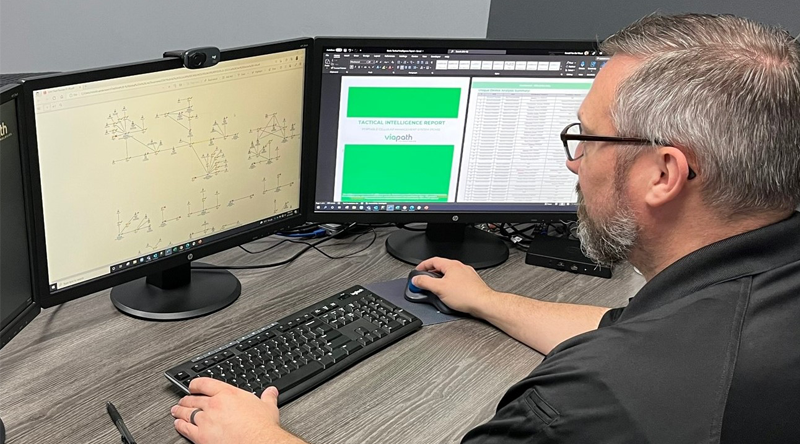The Role Public-Private Partnerships Play in Keeping Communities Safe and Secure
By Mitch Volkart
The shifting economy is taking a heavy toll on prisons, creating a vicious cycle of staffing shortages and problematic conditions. Facilities in some states are understaffed by as much as 50% due to the struggle of hiring new officers during a nationwide labor shortage. This presents a serious threat to the well-being of incarcerated individuals, officers and even the community at large.
Inadequate staffing can lead to reduced services, including in-person education opportunities, in-person visitation and overall movement within the facility. These restrictions often increase stress and anxiety, resulting in increased assaults from the incarcerated on other incarcerated individuals and staff. Additionally, minimal staffing creates a less secure perimeter that allows drugs and other contraband to more easily slip through.
Outsourcing work where possible relieves pressure from overworked prison officers and gives them the breathing room they need to prioritize the facility’s mission. Short of having the applicants to fill the vacancies, the implementation of technology and contract staff is an affordable and effective way to address these unstable and violence-prone symptoms.
Technology
Technological solutions such as tablets can relieve pressure from overworked staff while increasing the opportunities and productivity of the incarcerated. Implementing these tools is a cost-effective option that profoundly impacts overall facility function and safety.
With minimal staffing, prisons don’t always have the personnel to facilitate regular visitation. For instance, two-thirds of incarcerated males in one state can’t see visitors on the weekends due to staffing shortages. Between restricted visitation hours, family schedules and potential drive times, this means prisoners can go long periods without seeing their families. These forced gaps can lead to breakdowns in the community and support systems that are integral to prisoners both during and after incarceration.
Implementing tablets in prison facilities gives the incarcerated access to family members on their own schedule. While not a replacement for in-person visitation, virtual visitation relieves some pressure on prison staff and increases prisoners’ options. Technology’s outsized impact makes it a perfect fit for understaffed prisons, keeping the incarcerated visually connected with loved ones without creating additional work.
These technology-based solutions serve the added purpose of keeping the incarcerated more up-to-date with technology, thus minimizing their learning curve after release. Familiarity with the ever-changing world of technology is an increasingly important part of reintegrating with society and rejoining the workforce. Prisons can prepare incarcerated individuals for successful reintegration through technological advancement that keeps them connected.
Staffing shortages can also lead to a loss of access to much-needed resources, such as educational workshops or therapy, which can trigger a sense of hopelessness that incentivizes violence. Private vendors can provide virtual education and wellness resources that give prisoners the opportunities they need to make the most of their time in correctional facilities. Having the stability of constant access to these resources, regardless of how many prison staff there are, is essential to creating a productive environment where the incarcerated are prepared for long-term success.
These resources are shown to decrease violence in prisons, creating safer environments for all. Even more than addressing the labor shortage in prisons, public-private partnerships answer the need for a justice system that rehabilitates and equips those in its care for future success.
Contract staff
Partnering with private security-focused intelligence companies can help identify and resolve potential threats before they become dangerous to incarcerated individuals and officers. Prisons are currently struggling with a surge in drug use, due in part to the struggle of hiring sufficient staff. The use of drugs in prison is linked to increased violence and unrest, creating a strained environment that is less conducive to the rehabilitation and restoration of the incarcerated.
Dedicated intelligence analysts can pinpoint the presence and entry routes of drugs or weapons. These analysts, who come from a diverse set of backgrounds, are thoroughly trained in how to keep corrections facilities as safe as possible. Having experts monitoring for threat signals around the clock takes pressure off officers, helps identify issues before they happen and supports the resolution of any threatening behaviors.
Further, private sector organizations are able to follow the data wherever it points, free from the limiting processes and procedures common to many agencies. The ability to data mine traditionally prohibited sites such as social media or the dark web equips analysts with the tools they need to more effectively and efficiently identify, solve and mitigate illicit activity.
Proactively identifying potential threats relieves staff from the investigative and management demands associated with investigating and managing an incident. Safer, more effective prisons are everyone’s goal – partnering with private agencies can make that goal attainable for all facilities, whether understaffed or not.
Conclusion
As our economy continues to shift, prisons are straining under a heavy load. Public-private partnerships can help support prisons, relieving some of the stress they are facing in a changing economy. The impact of safer correctional facilities is felt far outside prison walls. It reaches into the lives of returning citizens, their families, correctional staff and the public at large. By leveraging these partnerships, prison administrators are able to prioritize everybody’s safety and well-being by protecting and equipping the incarcerated and their staff for success.
Mitch Volkart is the Vice President of Intelligence Solutions for ViaPath Technologies, a global corrections technology leader that facilitates successful reintegration for incarcerated individuals.

